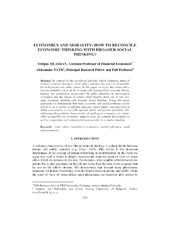Economics and Morality: How to Reconcile Economic Thinking with Broader Social Thinking
Поглавље у монографији (Објављена верзија)
Метаподаци
Приказ свих података о документуАпстракт
In contrast to the neo-liberal ideology which dominates much of
modern economic discourse, virtue ethics embraces the same set of morality
for both private and public sphere. In this paper we argue that virtue ethics
need nevertheless not at all be in clash with contemporary economic theory.
Linking the preferences represented by utility functions in neoclassical
economics and the system of values which inspires them can in our view
align economic thinking with broader social thinking. Using this novel
approach, we demonstrate that many economic and social problems can be
solved so as to arrive at efficient outcomes and a higher expected level of
utility compared to a case with separate public and private moralities. For
addressing the problems characteristic of small open economies, our virtue ethics
perspective on economics supports some government intervention as
well as cooperation and solidarity between societies in a similar situation.
Кључне речи:
virtue ethics / neoclassical economics / market efficiency / small open economiesИзвор:
Sustainable Growth and Development in Small Open Economies, 2018, 199-217Издавач:
- Budapest : Hungarian Academy of Science
Финансирање / пројекти:
- Политике друштвеног памћења и националног идентитета: регионални и европски контекст (RS-MESTD-Basic Research (BR or ON)-179049)
Колекције
Институција/група
IFDTTY - CHAP AU - Fatić, Aleksandar PY - 2018 UR - http://rifdt.instifdt.bg.ac.rs/123456789/1784 AB - In contrast to the neo-liberal ideology which dominates much of modern economic discourse, virtue ethics embraces the same set of morality for both private and public sphere. In this paper we argue that virtue ethics need nevertheless not at all be in clash with contemporary economic theory. Linking the preferences represented by utility functions in neoclassical economics and the system of values which inspires them can in our view align economic thinking with broader social thinking. Using this novel approach, we demonstrate that many economic and social problems can be solved so as to arrive at efficient outcomes and a higher expected level of utility compared to a case with separate public and private moralities. For addressing the problems characteristic of small open economies, our virtue ethics perspective on economics supports some government intervention as well as cooperation and solidarity between societies in a similar situation. PB - Budapest : Hungarian Academy of Science T2 - Sustainable Growth and Development in Small Open Economies T1 - Economics and Morality: How to Reconcile Economic Thinking with Broader Social Thinking SP - 199 EP - 217 UR - https://hdl.handle.net/21.15107/rcub_rifdt_1784 ER -
@inbook{
author = "Fatić, Aleksandar",
year = "2018",
abstract = "In contrast to the neo-liberal ideology which dominates much of
modern economic discourse, virtue ethics embraces the same set of morality
for both private and public sphere. In this paper we argue that virtue ethics
need nevertheless not at all be in clash with contemporary economic theory.
Linking the preferences represented by utility functions in neoclassical
economics and the system of values which inspires them can in our view
align economic thinking with broader social thinking. Using this novel
approach, we demonstrate that many economic and social problems can be
solved so as to arrive at efficient outcomes and a higher expected level of
utility compared to a case with separate public and private moralities. For
addressing the problems characteristic of small open economies, our virtue ethics
perspective on economics supports some government intervention as
well as cooperation and solidarity between societies in a similar situation.",
publisher = "Budapest : Hungarian Academy of Science",
journal = "Sustainable Growth and Development in Small Open Economies",
booktitle = "Economics and Morality: How to Reconcile Economic Thinking with Broader Social Thinking",
pages = "199-217",
url = "https://hdl.handle.net/21.15107/rcub_rifdt_1784"
}
Fatić, A.. (2018). Economics and Morality: How to Reconcile Economic Thinking with Broader Social Thinking. in Sustainable Growth and Development in Small Open Economies Budapest : Hungarian Academy of Science., 199-217. https://hdl.handle.net/21.15107/rcub_rifdt_1784
Fatić A. Economics and Morality: How to Reconcile Economic Thinking with Broader Social Thinking. in Sustainable Growth and Development in Small Open Economies. 2018;:199-217. https://hdl.handle.net/21.15107/rcub_rifdt_1784 .
Fatić, Aleksandar, "Economics and Morality: How to Reconcile Economic Thinking with Broader Social Thinking" in Sustainable Growth and Development in Small Open Economies (2018):199-217, https://hdl.handle.net/21.15107/rcub_rifdt_1784 .



